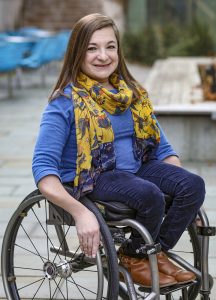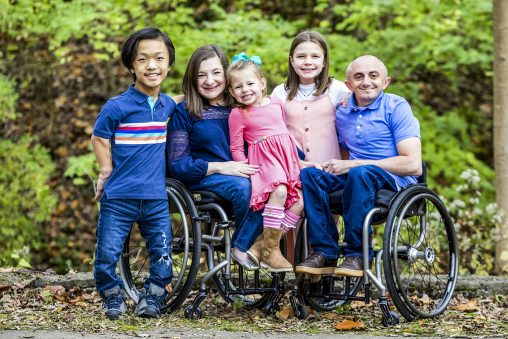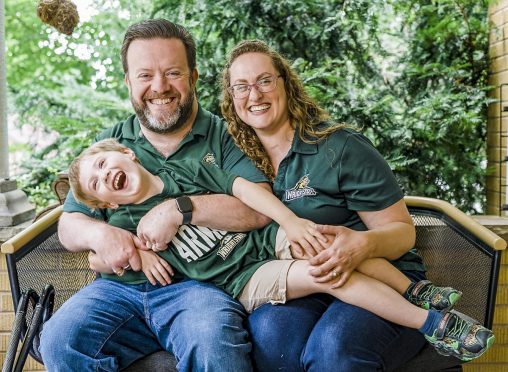By Alan Hieber ’16
It’s estimated that over 4 million people with disabilities in the U.S. have children under 18. In lieu of supporting these families, ableist barriers—whether a calculated policy or simple ignorance—often undermine them.
Kara Ayers is one of those parents. Born with osteogenesis imperfecta, which leads to fragile bones that are easily broken, she uses a wheelchair, as does her husband Adam. Together, they have three children: Eli, 14; Hannah, 11; and Riley, 4.
Research conducted by Through the Looking Glass, a nationally recognized center for families in which a child or parent has a disability, has overwhelmingly indicated that a parent’s disability in and of itself does not predict one’s ability to raise children. But Ayers, who graduated from Wright State with a psychology degree in 2004, says families like hers face a great deal of discrimination and scrutiny.
“It’s still legal in most states, including where I live (Ohio), to remove custody from parents on the basis of parental disability alone,” she said in a recent interview with her hometown newspaper, The State Journal, in Frankfort, Kentucky.
For this reason, Ayers is actively involved in disability policy through listening to stakeholders and educating policymakers in her work as an assistant professor and the associate director of the University of Cincinnati University Center for Excellence in Developmental Disabilities.
Ayers has spent years working in the disability rights movement and says she recognizes that policies shrouded by ableism can be detrimental to keeping a family together.
These policies, and the need for advocacy for disabled parents, led Ayers to co-found the Disabled Parenting Project, an online space for sharing experiences, advice, and conversations among disabled parents and those considering parenthood.
“My co-founders and I saw a need to better understand the experiences of disabled parenting and connect our community,” Ayers said.
Organizations that specialize in addressing the roadblocks of being a disabled parent can be somewhat of an aberration, but the advocacy is necessary for change, Ayers said.
“The most frustrating struggles are stigmatizing policies and attitudes that assume we can’t or shouldn’t be parents. Most parents problem-solve whatever challenges they face, but it’s peoples’ judgments that are harder to change,” Ayers said.
For parents with a disability, Ayers says, many times it can be the judgments of others that lead to unfair calls to child protective services, “which can threaten the family itself.”

Wright State alumna Kara Ayers is assistant professor and the associate director of the University of Cincinnati University Center for Excellence in Developmental Disabilities.
From Ayers’ perspective, there is support for disabled individuals geared toward other areas of life, but that seems to dwindle when parenting enters the picture.
“Our society celebrates things like people with disabilities going to college or getting a job, [but] when the prospect of parenthood is brought up, even allies or advocates for those other outcomes are sometimes silent,” Ayers said. “There’s an underlying belief that we can’t and thus shouldn’t parent, which isn’t supported by research. Studies show that our families actually have some unique strengths.”
Tom Webb is the director of Wright State’s Office of Disability Services and is a parent to 5-year-old Howie. Webb has spastic cerebral palsy and uses a mobility scooter. Additionally, his wife Becca has type-1 diabetes.
“Parenting with a disability, especially for disabled parents with physical and sensory-related disabilities, is very much overlooked,” Webb said. “While there are some glimmers of change, the majority of parents with disabilities frequently encounter institutional barriers to accessing basic things like child care, health care, and recreation with the children.”
Disabled parents are often left in the dark when it comes to child care because their circumstances are not considered, Webb continued.
“At best, this often requires creative and unorthodox solutions to system barriers, and at worst it means some disabled parents end up having limited or no access to services and experiences.”
This lack of access can be sparked by perceptions, Webb added. One significant barrier is promoting societal change by altering the attitudes held by some that people with disabilities are unable or unworthy of having children.
“A lot of this perception is based on ignorance and lack of exposure to people with disabilities within our communities,” Webb said. “Society has seen few, if any, positive depictions of people with disabilities being parents in film, TV, and media, or even in their local communities. Until we begin to have greater disability representation, I fear society will be operating under an outdated paradigm.”
Ayers says she and her husband have faced judgment and doubts as parents. She added that parenting obstacles are even present in situations that might seem trivial to others.
“It can be frustrating that planning for our family—whether it be an outing or a vacation—can be so complicated because there’s already a lack of accessible options, and when you attempt to fit a family of five into those options, it can feel impossible,” she said.
Ayers says the problem with many options deemed “accessible” are designed with the assumption that a disabled person will be alone or with a caregiver, not a child as well.
“When one of our kids is invited to a birthday party or has a softball game and we want to join them (or are expected to), this wouldn’t be a problem if more places in our community were accessible to all,” she said.
Webb says the obstacles he has faced have been minimal, but he is aware his background, experiences, and education have helped. However he has had struggles when certain measures have inadvertently caused issues.
“Finding a daycare that was accessible for my mobility scooter was a real challenge. Many daycares have security measures in place that have unintended consequences for the accessibility of parents with mobility-related disabilities,” Webb said.
The COVID-19 pandemic threw a new wrench into the challenges disabled parents face, especially when their conditions put them at high risk if they contracted the virus.
“It was a terrifying thought that we could leave our children parentless. We took it extremely seriously, which meant that our kids were also very isolated—often more so than their friends,” Ayers said. “In some ways the pandemic made more accessible options, like curbside or home delivery, more available to all.”
Through her professional role, Ayers works with the Center for Dignity in Healthcare for People with Disabilities. She says they aim to reduce health care inequalities.
Obtaining more equal treatment as a disabled parent can seem like an uphill battle at times, but Ayers has an unwavering confidence to push forward.
“The most challenging aspect of my work can be what feels like slow progress. It can be demoralizing to fight for basic things,” Ayers said. “The most gratifying is working with disabled students who are finding their identities and place in a professional world or their communities. They are our future. I know we will move the needle together.”
For more information on the Disabled Parenting Project, visit disabledparenting.com, and for information on resources from the Wright State Office of Disability Services, visit wright.edu/disability-services.



 Wright State names Rajneesh Suri dean of Raj Soin College of Business
Wright State names Rajneesh Suri dean of Raj Soin College of Business  ‘Only in New York,’ born at Wright State
‘Only in New York,’ born at Wright State  Wright State president, Horizon League leaders welcome new commissioner
Wright State president, Horizon League leaders welcome new commissioner  Wright State celebrates homecoming with week-long block party
Wright State celebrates homecoming with week-long block party  Wright State baseball to take on Dayton Flyers at Day Air Ballpark April 15
Wright State baseball to take on Dayton Flyers at Day Air Ballpark April 15 